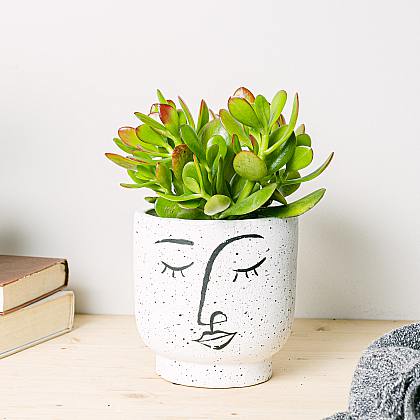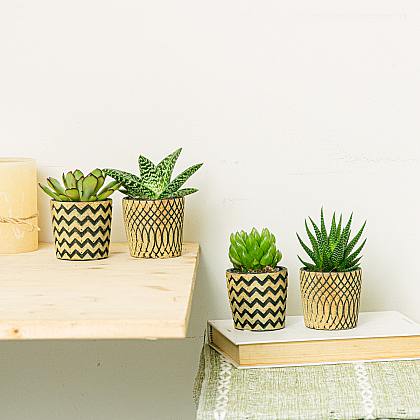Connecting with nature in the city: houseplants for millennials
Connecting with nature is becoming increasingly important in an age where urban life seems to take us away from it. For millennials who live in small apartments in cities, having houseplants can be a great way to bring a bit of nature into your home and improve your well-being
Connecting with nature is becoming increasingly important in an age where urban life seems to take us away from it. For millennials who live in small apartments in cities, having houseplants can be a great way to bring a bit of nature into your home and improve your well-being. In this article, we'll explore the different plants that are ideal for tight spaces and busy people, as well as those that purify the air and add a touch of style to the home. We will also give you practical tips on how to care for and maintain your houseplants and talk about the trend of vertical gardens in urban spaces.
The Power of Houseplants: Well-being and Connection with Nature
Houseplants are not only decorative elements, but they also have the power to provide well-being and connection with nature in urban environments. These plants are a great way to bring a little piece of nature into our homes and workspaces, allowing us to enjoy the benefits that nature offers.
Houseplants don't require large spaces, so they're ideal for apartments and tight spaces in the city. In addition, there are varieties that are low maintenance, perfect for busy people who don't have a lot of time to devote to plant care. These plants are able to purify the air and improve the quality of the indoor environment, eliminating toxins and producing fresh oxygen.
If you want to add a touch of style and personality to your home, you can opt for exotic plants. These plants will add a unique and eye-catching touch to your space, making it a place full of life and color.
Caring for and maintaining your houseplants is key to ensuring their health and growth. Some practical tips include watering them regularly but not excessively, providing them with the right amount of sunlight, and fertilizing them as needed. In addition, an increasingly popular trend in urban spaces is vertical gardens, which allow you to make the most of the available space.
In short, houseplants not only beautify our spaces, but also connect us with nature and improve our well-being. With options for all tastes and needs, these plants allow us to enjoy the benefits of nature even in urban environments.
Ideal plants for small spaces in urban apartments
Plants are an excellent option for adding life and color to the small spaces of urban apartments. There are many varieties that are perfectly suited to these places, such as succulents, cacti, and hanging plants. Succulents are ideal for those who don't have a lot of time to care for them, as they require little water and light. In addition, their small size makes them perfect for placing on shelves or small tables. Cacti are also a good choice for those looking for low-maintenance plants, as they don't need a lot of water or light. However, it is important to note that some varieties can be prickly and need to be handled with care. Hanging plants are perfect for those who want to add a touch of green to their homes without taking up floor space. Some popular options include English ivy, heart vine, and spider plant. These plants can also help purify the air indoors and create a cooler, more relaxing environment. In short, there are many plant options that are ideal for small spaces in urban apartments. It's important to choose plants that are suited to each home's lighting and temperature conditions, as well as consider the level of maintenance required to keep them healthy and vibrant.
Low-Maintenance Houseplants for Busy People
Low-maintenance houseplants are ideal for busy people who want to enjoy the beauty and benefits of having plants in their home, but don't have a lot of time to devote to caring for them. These plants require little attention and are very hardy, making them the perfect choice for those who have no prior gardening experience. Some popular choices include the snake plant (Sansevieria), which can survive in low light and occasional watering, and the Christmas cactus (Schlumbergera), which blooms during the winter and only needs moderate watering. Another option is aloe vera, a succulent plant known for its healing properties and only requiring watering every two weeks. Pothos (Epipremnum aureum) is another popular low-maintenance plant, as it can grow in both low-light and indirect light locations. For those looking for a splash of color, African violet (Saintpaulia) is a great choice, as it blooms year-round and only needs moderate watering. These plants are an easy and practical way to add a touch of nature to your home without requiring a lot of time or effort in caring for them.
Plants that purify the air and improve the quality of the indoor environment
Not only are houseplants a great way to decorate and liven up a space, but they can also significantly improve indoor air quality. Some plants, such as peace lily, bamboo palm, and ficus, are especially effective at purifying the air of harmful chemicals such as formaldehyde, benzene, and xylene. In addition, these plants can help increase humidity in the air, which can reduce dryness in the airways and prevent respiratory infections.
It's important to note that not all plants are created equal when it comes to their ability to purify the air. It is necessary to carefully choose the plants that will be placed indoors and make sure that they are suitable for the available space. For example, some plants require a lot of direct sunlight, while others prefer more shady environments.
Additionally, it's important to keep plants clean and healthy to ensure that they continue to purify the air effectively. This involves watering them properly, fertilizing them regularly, and pruning them as needed.
In short, if you're looking for an easy and effective way to improve the air quality in your home or workplace, consider adding some houseplants to your décor. In addition to their natural beauty, these plants also offer tangible health and wellness benefits.
Exotic plants that add a touch of style and personality to the home
Exotic plants are a great choice for those looking to add a touch of style and personality to their home. Some of the most popular options include the money plant, also known as Pachira aquatica, which is believed to attract good fortune and prosperity. Another exotic plant is the Tillandsia, also known as the "air plant", which does not require soil and can be hung anywhere. Hoya Carnosa, or "wax plant," is another popular choice because of its beautiful flowers and glossy, waxy leaves. Additionally, the snake plant, also known as Sansevieria, is a great choice for those looking for a low-maintenance plant that also helps purify the air.
It's important to note that some exotic plants may require more care and attention than others, so it's important to do your research before buying. Some may require direct sunlight, while others prefer partial shade. It's also important to make sure that exotic plants are adapted to your home's climate, as some may need specific levels of humidity or temperature.
In conclusion, exotic plants are a great way to add a unique and personal touch to your home. From the money plant to Hoya Carnosa and Tillandsia, there are plenty of options available for all tastes and lifestyles. However, it's important to do your research before you buy to ensure that your chosen plant is suited to your household conditions and doesn't require more care than you're willing to provide.
How to Care for and Maintain Your Houseplants: Practical Tips
Caring for and maintaining your houseplants is essential to ensure their growth and health. Here are some practical tips to help you achieve this. First of all, it is important to know the specific needs of each plant in terms of light, watering, and temperature. Some plants require indirect light, while others need direct sunlight. In addition, it is necessary to water them regularly, but avoid overwatering that can cause root rot. It is advisable to check the soil moisture before watering again. It is also important to maintain an adequate temperature for each plant, avoiding sudden changes that can affect its development.
In addition to watering and lighting, it is necessary to provide nutrients to the plants. Using a suitable fertilizer and following the instructions for use is essential to keep them healthy and strong. It is also important to be aware of possible pests or diseases that may affect our plants. Regularly inspecting the leaves and stem will allow us to detect any problems early and apply the necessary treatments.
Finally, don't forget to clean the leaves of your houseplants to remove dust and allow them to photosynthesize properly. Use a damp cloth or soft sponge to gently wipe them clean.
By following these practical tips, you can enjoy healthy and lively houseplants in your home. Remember to dedicate time and attention to them regularly to ensure their well-being and connection with nature in your urban space.
The trend of vertical gardens in urban spaces
Vertical gardens have become an increasingly popular trend in urban spaces. These structures, also known as green walls, consist of the installation of plants on vertical walls or structures, thus creating a vertical garden. This option is ideal for those who live in apartments or houses with small spaces, as it allows you to take advantage of the available vertical space. In addition to being aesthetically appealing, vertical gardens offer a number of practical benefits. On the one hand, they help purify the air and improve the quality of the indoor environment, as plants absorb carbon dioxide and release oxygen. They also act as thermal and acoustic insulators, helping to maintain a cooler temperature in summer and reducing noise coming from outside. To create a vertical garden, it is important to choose plants suitable for this type of structure, such as ferns, bromeliads, or succulents. In addition, aspects such as the amount of light the garden will receive and the availability of water for irrigation must be considered. Maintaining a vertical garden requires certain care, such as regularly watering the plants and providing them with necessary nutrients. However, with a little attention and dedication, vertical gardens can be a great way to connect with nature in urban settings and add a green and fresh touch to our home.
Finding a space to connect with nature in the city may seem difficult, but not impossible. indoor plants are an excellent option to get closer to that natural environment that we need so much. In addition to their aesthetic beauty, they provide us with multiple benefits for our well-being and health. We now know which plants are ideal for confined spaces, those that require little maintenance, and those that purify the air. We have also learned about exotic plants and the trend of vertical gardens in urban spaces. But it is not enough to have these plants at home, we must take care of them and maintain them properly so that they continue to be a source of well-being and joy. We hope that these practical tips will be of great help to all those millennials who want to connect with nature in the city through their houseplants. And you, do you already have your plants at home? Have you noticed any difference in your mood or air quality? Share your experiences and help us continue exploring this wonderful plant world!


